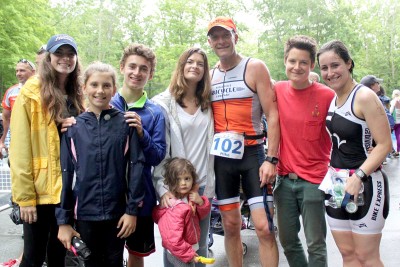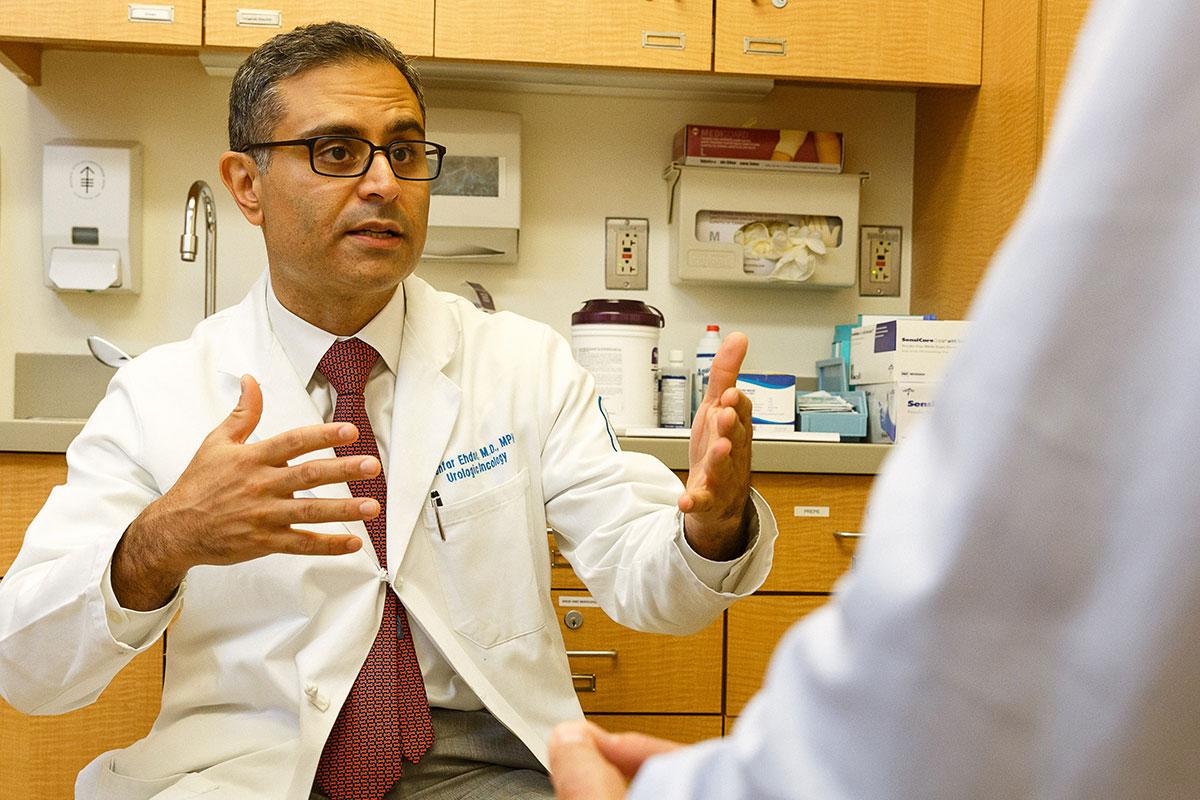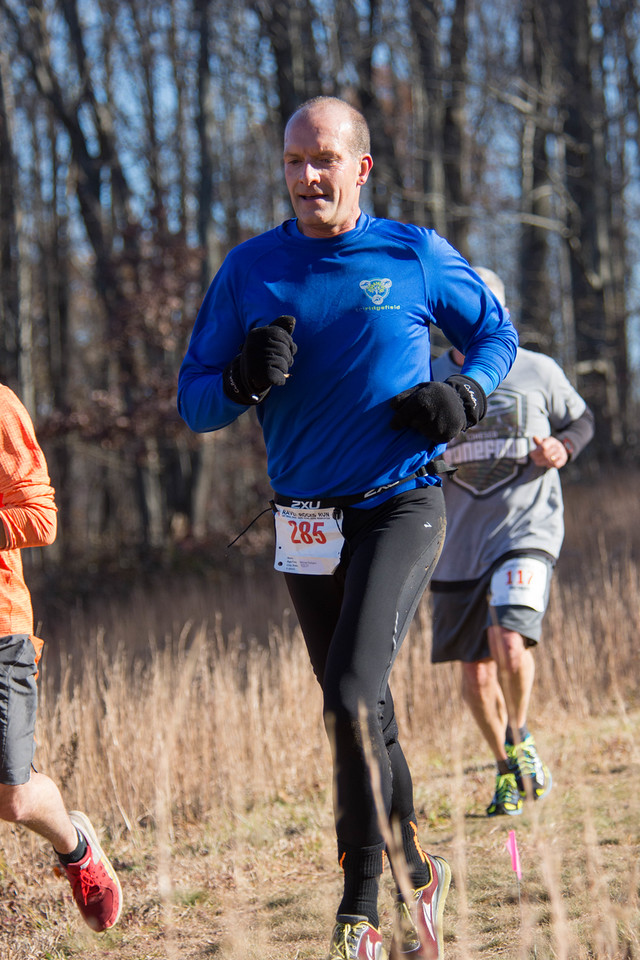Mike's Prostate Cancer Survival Story
Mike wasn't ready to give up the activities he loved after being diagnosed with prostate cancer. He underwent surgery at Memorial Sloan Kettering and quickly got back to his favorite pastimes: swimming, biking, and running.

- When Mike Rodgers was diagnosed with prostate cancer, he came to MSK and felt comfortable and confident in the hands of surgeon Behfar Ehdaie.
- Mike underwent a robotic radical prostatectomy at the Josie Robertson Surgery Center and went home the next day.
- He was extremely dedicated to his recovery and competed in a triathlon four months later.
Mike Rodgers had run more than 35 marathons, competed in numerous triathlons, and taught Spin classes in his spare time. He was a healthy eater, never smoked, and always went for his annual physical.
“When you go for the big life insurance policy, I always got the highest possible health score,” the 58-year-old father of six says with a laugh.
But in October 2015, Mike’s prostate-specific antigen (PSA) score had been on the rise. The number measures a protein that is often elevated in men with prostate cancer. His doctor recommended a prostate biopsy. Mike went to a clinic near his home in Connecticut and was shocked to learn he had prostate cancer.
“It just blew me away,” Mike recalls. “You go through all kinds of fear and emotional trauma. Everyone I know said to go to Memorial Sloan Kettering, but it hadn’t been in my mind yet because I was still in shock.”
A serendipitously timed appointment with his chiropractor made the decision easier for Mike.
“He said, ‘Take this number and call as soon as we finish. My sister is a nurse [at MSK],’” Mike remembers. As soon as he placed his first phone call, he knew he had made the right move.
“It was the most compassionate, caring, thoughtful conversation, and that’s how you’re received into MSK,” Mike says. “I still carry the little Post-it with her number in my wallet.”
Making a Plan
Meeting urologic surgeon Behfar Ehdaie “gave me a lot of comfort,” Mike recalls. Dr. Ehdaie explained the particulars of Mike’s prostate cancer diagnosis and presented Mike and his wife with several treatment options. These included surgery, radiation, and focal therapy, which attacks cancer cells that are localized to one area. He sent Mike for an MRI at MSK Westchester, a location convenient to him, to determine the exact location of the tumor and help guide a treatment plan.
Because the cancer was located in multiple parts of the prostate, focal therapy was not recommended. The hormones administered alongside radiation have the potential to cause sexual dysfunction and incontinence, which Mike wanted to avoid. After careful consideration and research, Mike decided that surgery was his best option.

“Mike was interested in anything that would minimally affect his quality of life,” Dr. Ehdaie says. “And we were interested in what’s important to him and his overall quality of life, and not only focusing on the prostate cancer. We had a team approach from day one.”
Mike opted for a radical prostatectomy, which would remove his prostate but keep the nerves needed for urinary and sexual function. Dr. Ehdaie would use robotic instruments and minimally invasive incisions, as is standard at MSK.
“With a robotic radical prostatectomy, there’s less blood loss and magnified visualization, and the healing time is quicker,” Dr. Ehdaie says.
Mike also met with John Mulhall, a urologic surgeon in MSK’s Male Sexual and Reproductive Health Program, to learn about maintaining sexual function postsurgery.
“Our purpose is to not just add years to life but add life to years,” Dr. Mulhall says. “Early therapy and rehabilitation is structured to minimize the long-term consequences from a sexual function standpoint.”
Patient-Centered Healthcare
In February 2016, the night before his surgery, Mike and his wife went out to dinner. At about 8 o’clock, Mike’s phone rang: It was Dr. Ehdaie, calling to check in on his patient. Mike couldn’t believe it.
“He said, ‘I’m sitting here with your surgery team, and we’ve got a great plan for tomorrow,’” Mike says. “My jaw was on the ground. To me, he’s like a rock star that I shouldn’t even be in the presence of. It was like Mick Jagger calling me. That was such a nice way to wrap up the night and go to bed, knowing I was in such good care.”
That feeling extended to the next day at the Josie Robertson Surgery Center. “I was so impressed with the level of information everyone gave me that I almost didn’t have any questions because they were so good at how they described things,” he says.
When Mike walked into the operating room, he saw Dr. Ehdaie himself prepping the table for Mike’s comfort. Before he knew it, he was waking up in recovery. The next day, he went home.
A Speedy Recovery
Mike was intent on recovering as quickly as possible so he could get back to the activities he loved. For the first week he was home, he wore shirts from previous races to remind him of his goals.
“I’d get up and see myself in my shirt and say, ‘This is what I’m going for,’” he recalls.
His determination was unmatched. Just three weeks later — after he had mastered walking on his own — Mike got back to swimming.
“That’s where I felt the most normal again,” says Mike. “As soon as I pushed off the wall, I thought, Oh, my gosh, I’m alive again.”
Four weeks after that, he was back in the bike saddle teaching a Spin class.
“He’s a highly motivated patient and has a positive outlook. These factors are important to help with healing after surgery,” Dr. Ehdaie says.
Running proved to be a challenge for Mike as he recovered. But he had a friend who he could turn to for advice: Mike Castellano, a fellow prostate cancer survivor and avid marathoner. The men met through MSK’s online peer-to-peer support network. Running postsurgery had also been difficult for Mike Castellano, but walking regularly had helped ease his transition.

That wisdom sustained Mike as he geared up for his first race since the surgery, a 5K in April 2016. He ran the race while pushing his two grandkids in a stroller.
After that, it was off to the races, literally. Conquering that 5K gave Mike the confidence to tackle his big comeback event: a triathlon exactly 16 weeks postsurgery. The hot and rainy race-day conditions were not ideal, but incredibly, Mike managed to finish 24 seconds faster than he did the previous year.
“Returning to that first triathlon was the most important and treasured race of my entire life,” he says. “None will ever compare, before or after. I cried twice during the run because I realized how far I had come in 16 weeks. Once I crossed the finish line, I could not hold back the tears.”
Mike filled the rest of the spring and summer with more triathlons, relay races, half marathons, and open-water swim events. He’s participated in more than 20 races since his surgery and has been cancer free for nearly two years.
While his accomplishments are impressive, Mike says his attitude and a good support system made a huge difference in his recovery.
“Honestly, I could coach anybody through this,” he says. “I could help anybody achieve what I’ve achieved if they put the work in and they were teamed up with good doctors like I was. I believe that.”






